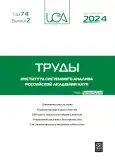Individual issues of implementing a digital citizen profile
- Authors: Orlova E.R.1, Golomanchuk А.V.2
-
Affiliations:
- Federal Research Center «Computer Sciences and Control» RAS
- Russian Academy of National Economy and Public Administration under the President of the Russian Federation
- Issue: Vol 74, No 2 (2024)
- Pages: 96-105
- Section: System analysis in medicine and biology
- URL: https://journal-vniispk.ru/2079-0279/article/view/287370
- DOI: https://doi.org/10.14357/20790279240211
- EDN: https://elibrary.ru/ZPBQJG
- ID: 287370
Cite item
Full Text
Abstract
The article considers some problems of the content and essential elements of a citizen’s digital profile. The introduction of a digital citizen profile, also known as digital identification or electronic passport, is of interest to Russia as a potential means of improving public services, increasing security and simplifying bureaucratic procedures. In the article, the authors present some features and directions of the implementation of the digital profile of a citizen in Russia and arguments in favor of its implementation, as well as potential risks associated with its implementation. The authors reveal the specifics of how the digital profile of a citizen is integrated with existing digital systems in Russia, from a digital and legal point of view, as well as identify individual directions and components of this process.
About the authors
E. R. Orlova
Federal Research Center «Computer Sciences and Control» RAS
Author for correspondence.
Email: orlova@isa.ru
Doctor of Economics, Professor, Head of Department
Russian Federation, MoscowА. V. Golomanchuk
Russian Academy of National Economy and Public Administration under the President of the Russian Federation
Email: golomachuk-ev@ranepa.ru
Candidate of Legal Sciences, Volgograd Institute of Management
Russian Federation, VolgogradReferences
- https://www.kommersant.ru/doc/6053673#:~:-text=From%20beginning%202023%20year%20occurred,leaked%20example%20600%20mn%20records.
- Dolganova O.I., Vasilyeva E.V., Ryabov D.A. Digital profile of a citizen: a necessary and sufficient set of personal data. // Issues of innovative economics. 2022. Vol. 12. No. 3. P. 1523-1540.
- Silaskova J., Takahashi M. Estonia built one of the world’s most advanced digital societies. During COVID-19, that became a lifeline. World Economic Forum. 07/01/2020. URL: https://www.weforum.org/agenda/2020/07/estonia-advanced-digital-society-here-s-how-thathelped-it-during-covid19 (date of reference: 02/24/2024).
- Egorova M.A. The problem of digital identity identification in the Russian Federation and the European Union. // Bulletin of the O.E. Kutafin University (MGUA). 2022. № 1 (89). P. 17-29.
- Petrov A.A. Chinese digital profile or scoring system of social trust. // Chronos. 2020. № 8 (47). P. 11-24.
- Stepanov O.A., Stepanov M.M. Legal regulation of the genesis of the digital personality. // Law enforcement. 2022. Vol. 6. No. 3. P. 19-32.
- Madon S., Ranjini C., Anantha K.R. Aadhaar and social assistance programming: local bureaucracies as critical intermediate // Information Technology for Development. 02.01.2022. DOI: https://doi.org/10.1080/02681102.2021.2021130.
- Dash D.K. Soon use a single sign-in to access plethora of government services, entitlements // The Times of India. 23 12 2021. URL: https://imesofindia.indiatimes.com/india/soon-use-asingle-sign-in-to-access-plethora-of-government-servicesentitlements/articleshow/88441610.cms (date of application: 02/29/2024).
- Mungara S. Kids below five years of age in Telangana can now enroll for // Times of India. 07/12/2022. URL: https://timesofindia.indiatimes.com/city/hyderabad/kids-below-five-yearsof-age-in-telangana-can-now-enroll-for-aadhaar-cards-through-postoffices/articleshow/92165480.cms (accessed: 02/29/2024).
- Mi Argentina. URL: https://www.argentina.gob.ar/miargentina (date of application: 02/28/2024).
- Vnukova I.V., Kurdynko A.P. Features of the implementation of the concept of «smart city» in Russia and Singapore: comparative analysis. // Formation of the socio-political concept of «smart city»: world and Russian experience. Materials of the scientific conference of the Department of Russian Politics, Faculty of Political Science, Lomonosov Moscow State University. Edited by I.A. Vasilenko. 2019. P. 131-138.
- Mochalov A.N. Digital profile: the main risks for constitutional human rights in conditions of legal uncertainty. // Lex Russica (Russian Law). 2021. Vol. 74. No. 9 (178). P. 88-101.
- Bashkirova O.V., Dolganova O.I., Slavin B.B. Digital profile of a citizen: world practice of creation and application. // Information Society. 2023. No. 2. P. 134-144.
- Kondakov A.M., Kostyleva A.A. Digital identity, digital self-identification, digital profile: problem statement. // Bulletin of the Peoples’ Friendship University of Russia. Series: Informatization of education. 2019. Vol. 16. No. 3. P. 207-218.
- Sadovsky V.N. The foundations of the general theory of systems. M.: Nauka. 1974. 276 p.
- Larichev O.I. Verbal analysis of solutions. M.: Nauka. 2006. 181 p.
- Chesnokov S.V. Determinational analysis of socioeconomic data. M.: Nauka. 1982. 168 p.
- Chereshkin D.S., Roizenzon G.V., Britkov V.B. Application of artificial intelligence methods for risk analysis in socio-economic systems // Information Society. 2020. No. 3. P. 14-24.
Supplementary files









